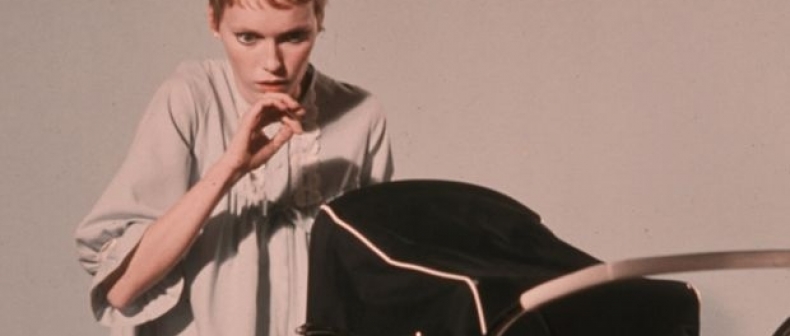
Mia Farrow, from Emily Schultz’s online mood board for The Blondes
Text/Book, the Toronto Standard‘s books column, is written by Emily M. Keeler and Chris Randle, plus occasional guests.
Reviews of Emily Schultz’s The Blondes have, since the last time I wrote to you about it, started to pile up. Which is good, which is great, because like I said last time I need people to talk about this book with. But one review in particular has me giggling in a fit of incredulity. It’s not so much that Hubert O’Hearn’s rambling review is off base–it’s more like it’s been translated from a language spoken only on some other planet.
Because so much of Schultz’s novel details the complicated, strained relationships that her narrator develops with other women, and of course the academic perspective that poor plain Hazel Hayes uses to orient herself in a world of dangerous beauty, a world of looking and being looked at, there are scenes that describe and analyze a cynicism toward the curses and specific privileges beauty bestows on attractive women. Hazel is afraid of beauty, even before it becomes a site of medical panic and fury, because it confers a certain, though limited, power. O’Hearn seems blind to the limits of beauty as a source of power, setting it up as an uncomplicated ideal, and instead of thinking through the nuance and mess that Schultz presents in The Blondes he dismisses her narrator out of hand.
Hayes, in an effort to acquire guidance for her thesis project, sums up her fear for a potential advisor: “’Beautiful women,’ I said, ‘are full of anger over their privilege. They use deceit as a kind of trade…It’s an addiction. And like all addicts, they’re controlling and abusive, full of insecurity and rage.’” O’Hearn, having known beautiful women even once or twice–I mean, “on sonnet-worthy occasions,” he’s had the privilege of knowing them carnally, begs to differ. Beautiful women are completely beautiful, he insists. None of this ugly rage and insecurity business, no, because everyone knows that “beautiful women exist in a warm snow bubble of serenity, above and beyond the storm.”
Aside from the delightful ridiculousness of the imagery, the “warm snow bubble” actually seems like a rather apt metaphor for the impossible, dazzling emptiness expected of flatly idealized women in literature, and, of course, in the already-mediated world.
Jenny Diski’s Like Mother, one of the narratives of natality The Blondes inspired me to seek out, is about exactly this; the story is narrated by a newborn infant with the rare condition of anencephaly, which is to say the book is narrated by a tiny living body born without a brain. Diski’s brainless narrator constructs a dialog with an imaginary other, and through a trick of magical–or rather, pre-cognitive?–realism describes her beautiful mother’s life to a dubious and imaginary listener. The listener interjects occasionally, presumably on behalf of the reader, to ask questions and challenge the authority of the brainless infant narrator. And the anencaphatic infant, whose mother calls her Nony, short for nonentity, responds in a language outside of language, saying the whirling chemicals in her empty head contain enough knowledge of her mother to fuel the story, told however she might tell it.
The mother character, Frances, is a beautiful woman. She is a dancer. Before that she is a child, discovering the thrill of sex with a boy on the destroyed lot of a bombed-out house. After that she is sexually assaulted by her drunk mother. After that she manipulates a man into taking care of her though she can’t muster up the basic requirement of esteem for anything at all to even regard him with more than basic neutral acknowledgement, let alone love. Frances loves her Nony because they have something in common: they’re both empty.
Unlike Hazel, of whose plain, even dumpy appearance much is made, Frances belongs to a line of feminine characters who spend so much time working on their surfaces that they neglect to build anything for themselves inside. Not to get too psychoanalytic on you, but it’s like they try to embody the notion of woman as vessel, with an outside decorated to make appealing the terrifying chasm, the hollowness contained therein.
Perhaps I admire Hazel because she, as an academic with a mind overstuffed with theories of looking outward on the world, rejects the emptiness of the “warm snow bubble” of beauty, even if she imagines ugliness in its place. And perhaps I was so struck by Schultz framing this story as one told by a woman the exact opposite of the emptiness inside her because I can’t bring myself to think of women, beautiful or otherwise, as pretty lacking things. Schultz and Diski both prove just the opposite; there are stories there, on the inside.
_____
Emily M. Keeler is a writer and the editor of Little Brother Magazine. Follow her on Twitter at @emilymkeeler if you please.
For more, follow us on Twitter at @torontostandard, and subscribe to our newsletter.











